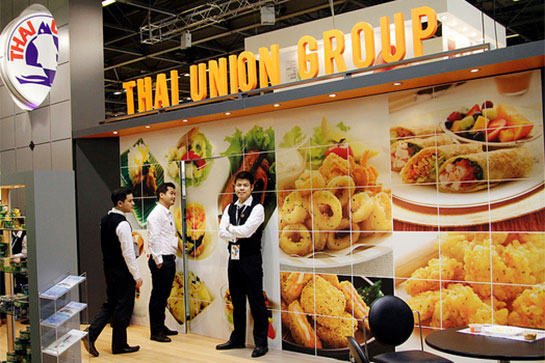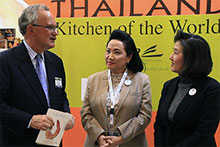From producers of frozen shrimp and seafood to suppliers of fruits, vegetables, ready meals and other value-added products, Thailand’s robust food industry was well represented at the SIAL exhibition in Paris. Indeed, there were 135 companies at the Thai Pavilion alone.
As the show attracts thousands of major food buyers, importers, traders, NGOs and journalists from Europe and around the world, the Royal Thai Embassy in Paris and the Department of International Trade Promotion (DITP) took the opportunity to invite visitors to an information meeting regarding progress that has been made in labor rights and social responsibility within Thailand’s extensive fishery and seafood processing sectors. It featured a panel of government officials and commercial experts who also reported the achievements to European Commission officials in Brussels.
The seafood industry is big business for Thailand, having rung up almost US $9 billion in export sales of approximately 1.9 million tons last year, accounting for 1.5% of the nation’s foreign exchange earnings. It generates upwards of 40% of total food export revenues and employs as many as two million people during peak production periods. Migrants from Myanmar, Laos and Cambodia represent an increasing part of the workforce.
 The Thai Union Group and other frozen seafood companies from Thailand promoted their product lines at the SIAL fair in Paris. Almost $9 million worth of fish and seafood was exported by the nation last year, most of it in frozen form. Thai Union has been in the forefront of further enhancing good labor practices in the seafood industry.
The Thai Union Group and other frozen seafood companies from Thailand promoted their product lines at the SIAL fair in Paris. Almost $9 million worth of fish and seafood was exported by the nation last year, most of it in frozen form. Thai Union has been in the forefront of further enhancing good labor practices in the seafood industry.
The alleged abuse of migrant fishermen on Thai-flagged vessels, as reported in the UK’s Guardian newspaper last summer and amplified by many other media outlets, has prompted the Thai government and food industry to address the issue head-on and take measures as needed.
“Cases of human trafficking and forced labor are isolated incidents in a sector that is a small fraction of the Thai food industry,” according to Minister Pakaisakdi Svastishinha of the Office of Commercial Affairs in Paris.
“We don’t deny the problem, but have taken the delegation to Europe to assure all that we are working hard to solve the problem and improve the situation,” said Sarun Charoensuwan, director general of the Foreign Ministry’s Department of European Affairs.
As such, an in-depth seminar entitled “Thai Seafood: Advancement of Labor and Social Responsibility,” was presented at the SIAL venue on October 21. It covered everything from the implementation of labor protection measures and surveillance in the fishing industry to law enforcement and steps that the private sector has taken to implement positive changes.
Two of the seminar’s participants, M.L. Puntrik Smiti, deputy permanent secretary of the Ministry of Labor, and Dr. Waraporn Promoj, senior international fisheries specialist at Department of Fisheries, Ministry of Agriculture and Cooperatives, gave FrozenFoodsBiz a detailed assessment of progress that has been achieved during a videotaped interview. Much of what they had to say will be made available through a link provided in our next E-Newsletter, as well as via the FrozenFoodsBiz.com website.
 M.L. Puntrik Smiti (center), deputy permanent secretary of Thailand’s Ministry of Labor, and Dr. Waraporn Promoj (right) of the Department of Fisheries talk with John Saulnier, editorial director of FrozenFoodsBiz, about the ongoing progress being achieved to guarantee labor rights and assure social responsibility for migrant workers in Thailand.Deputy Permanent Secretary Puntrik emphasized that the Ministry of Labor is fully determined to eliminate human trafficking, and has singed memoranda of understanding with its counterparts Laos, Myanmar and Cambodia regarding employment cooperation among the three countries.
M.L. Puntrik Smiti (center), deputy permanent secretary of Thailand’s Ministry of Labor, and Dr. Waraporn Promoj (right) of the Department of Fisheries talk with John Saulnier, editorial director of FrozenFoodsBiz, about the ongoing progress being achieved to guarantee labor rights and assure social responsibility for migrant workers in Thailand.Deputy Permanent Secretary Puntrik emphasized that the Ministry of Labor is fully determined to eliminate human trafficking, and has singed memoranda of understanding with its counterparts Laos, Myanmar and Cambodia regarding employment cooperation among the three countries.
“When employment is in accord with the law, we can insure that workers’ rights are protected,” she said.
Until recently a significant portion of the foreign workforce in Thailand had been undocumented, which meant that labor complaints were typically not filed by disgruntled workers who may have feared losing jobs and much needed income to support families back home.
That is changing now that, in cooperation with neighboring nations, the Thai government and National Council for Peace and Order (NCPO) has ordered registration of all migrant workers. Eighty-two stations were set up around the country this summer to facilitate the effort, and it is estimated that 1.4 million persons have been registered and issued working papers thus far – of which more than 49,000 are engaged in the fisheries sector.
“No to child labor, no to forced labor and no to trafficking in persons!” These are the first three steps of a 10-point Good Labor Practices (GLP) program set up to create better workplaces, as outlined by Dr. Waraporn. She reported that 178 shrimp and seafood processing companies in Thailand are voluntarily implementing GLP standards in line with a program launched in collaboration with the International Labor Organization to improve conditions on job sites.
Meanwhile, fishing vessels with eight or more crew members are being closely monitored and inspected both at sea and while in port by half a dozen government agencies, including the Royal Thai Navy, the Marine Police and the Department of Fisheries. Inspectors are making sure that labor laws as well as sustainable fishing practices are being adhered to properly.
On the law enforcement front, Pol. General Chatchawal Suksomjit, director general at the Department of Special Investigation of the Ministry of Justice, has made assurances that the prosecution of brokers who illegally supply undocumented labor to enterprises based in Thailand will continue relentlessly. At the same time, the treatment of migrant workers will be monitored regularly and employers will continue to be encouraged to manage their migrant worker system more efficiently.
Having prosecuted 28 cases of human trafficking in the fishing sector last year, Director General Chatchawal pointed out that Thailand has a number of laws on the books that are being utilized to fight illegal human trafficking. They range from the 2008 Anti-human Trafficking Act and the Alien Working Act to the 1998 Labor Projection Act and the 1947 Fishery Act.
On the shrimp and fish processing front, the Thai Frozen Foods Association (TFFA) has been in the vanguard of improving working conditions at factories for some time. Members who seek to maintain the services of good employees and maximize productivity have driven the effort, as skilled factory labor is essential to their operations.
Dr. Panisuan Jamnarnwej, president emeritus of the TFFA, told FrozenFoodsBiz earlier this year during the Boston Seafood Show that any member of the 200-plus company organization (most of whom are frozen shrimp and seafood processors) guilty of exploiting migrant workers will dealt with severely.
“Such behavior will be regarded as cheating on fellow members, and the result will be that they will be expelled from the group,” he stated in no uncertain terms.
Thai seafood companies, concerned that fallout from the Guardian newspaper story last June could lead to negative commercial consequences [indeed, the large Carefour retail chain headquartered in France suspended import of prawns of Thailand for a period], were quick to assure buyers and consumers about their fair employment practices.
For example, Thiraphong Chansiri, president and chief executive officer of TUF, a major producer and exporter of frozen shrimp and canned tuna, said: “The Thai Union Group would like to restate that its ethical business sourcing policy prohibits any form of forced labor, child labor or exploitation of human rights, and it is working uncompromisingly to comply with international standards to prevent human rights violation of any kind. We have made it very clear [to suppliers] that any misconduct in relation to human trafficking will result in a suspension of our trade relationship, with no compromises.”
He continued: “We work with relevant stakeholders to ensure necessary actions are taken by creating constructive dialogue and cooperating on improving human rights practices throughout our supply and distribution chains. Thailand’s industry associations have been working extremely hard as a ‘Thailand Team’ to improve good labor practices in the fishing industry since 2010, and significant progress has been made.” – Reported by John Saulnier





